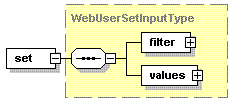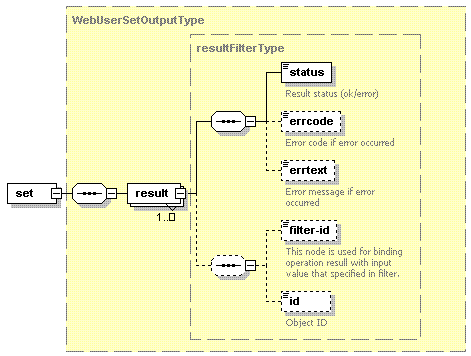Updating Web User Settings
Use the set operation to change settings for existing web users on the site.
Request Packet Structure
A request XML packet updating settings of web users includes the set operation node:
<packet version="1.6.7.0">
<webuser >
<set>
...
</set>
</webuser>
</packet>
The set node is presented by type WebUserSetInputType
(webuser.xsd), and its graphical representation is as follows:

Note: The interactive schema navigator for all request packets is available here: http://plesk.github.io/api-schemas/1.6.8.0/agent_input.svg.
- The filter node is required. It specifies the filtering rule.
For more information, refer to the Available Filters
section. Data type: WebUserFilter (
webuser.xsd). - The values node is required. It specifies settings that are
updated for web users. For more information, refer to the Web User
Settings and Preferences section. Data type:
WebUserSetParam (
webuser.xsd).
Remarks
You can change settings of multiple web users using different filtering rules in a single packet. Add as many set operations as the number of different filtering rules to be used.
<packet version="1.6.7.0">
<set>
...
</set>
...
<set>
...
</set>
</packet>
Response Packet Structure
The set node of the output XML packet is presented by type
WebUserSetOutputType (webuser.xsd) and structured as follows:

Note: The interactive schema navigator for all response packets is available here: http://plesk.github.io/api-schemas/1.6.8.0/agent_output.svg.
- The result node is required. It wraps the response retrieved
from the server. Data type: resultFilterType (
common.xsd). - The status node is required. It specifies the execution status of the set operation. Data type: string. Allowed values: ok | error.
- The errcode node is optional. It returns the error code if the set operation fails. Data type: unsignedInt.
- The errtext node is optional. It returns the error message if the set operation fails. Data type: string.
- The filter-id node is required. It returns a filtering rule parameter. For more information, refer to the Available Filters section. Data type: anySimpleType.
- The id node is optional. If the set operation succeeds it holds the ID of the updated web user. Data type: integer.
Samples
Updating settings of a single web user
An Agent sends the following request to disable CGI and fastCGI support for the web user identified by login name AbCdEf.
<packet>
<webuser>
<set>
<filter>
<login>AbCdEf</login>
</filter>
<values>
<cgi>0</cgi>
<fastcgi>0</fastcgi>
</values>
</set>
</webuser>
</packet>
Response:
<packet>
<webuser>
<set>
<result>
<status>ok</status>
<filter-id>AbCdEf</filter-id>
<id>14</id>
</result>
</set>
</webuser>
</packet>
Updating settings of multiple web users
The request packet is as follows:
<packet>
<webuser>
<set>
<filter>
<site-id>13</site-id>
<site-id>14</site-id>
</filter>
<values>
<mod-python>0</mod-python>
</values>
</set>
</webuser>
</packet>
Response (if three users updated on the site with ID 14, and the site with ID 13 was not found on the server):
<packet>
<webuser>
<set>
<result>
<status>error</status>
<errcode>1015</errcode>
<errtext>Domain does not exist</errtext>
<filter-id>13</filter-id>
</result>
<result>
<status>ok</status>
<filter-id>14</filter-id>
<id>168</id>
</result>
<result>
<status>ok</status>
<filter-id>14</filter-id>
<id>158</id>
</result>
<result>
<status>ok</status>
<filter-id>14</filter-id>
<id>116</id>
</result>
</set>
</webuser>
</packet>